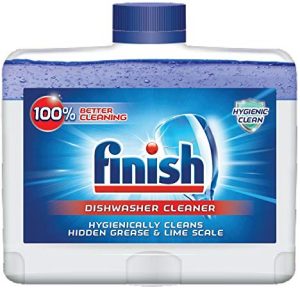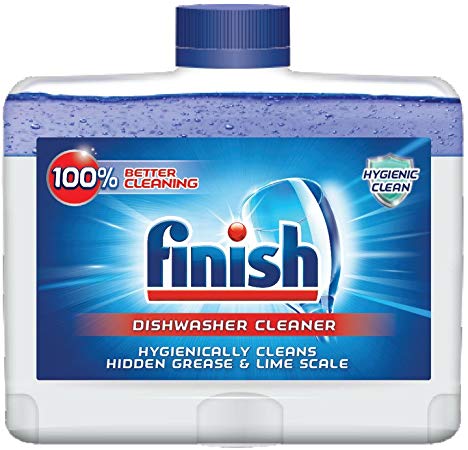Why does my dishwasher machine make dishes white?
There exists a myriad of reasons why anything you place inside your dishwasher becomes covered in a white residue. They can range from water sediments to faulty use of detergent and even broken components.
Join me now, as I elaborate on what might be the reasons your dishes and/or dishwasher are covered in white residue.
What is causing the white residue?
Cause 1
Hard water. Depending on your region, the water you are using might be too ”hard” or it might have a bad quality; translated, this means that it is choked with limestone, calcium, chlorine and other such residues, leaving behind it layers of white residue.
Solution
The best way of dealing with this is by getting yourself a high-quality dishwasher salt for your dishwasher’s water softener. It works by taking out the minerals, namely the calcium and the magnesium. Or better said, it takes the ”hard” Ions and replaces them with soft Ions, cleaning the water and removing most impurities.
Check this video for how to use dishwasher salt properly:
Another way of dealing with hard water is to filter it using an external device. This is done by using a simple thing called a Reverse Osmosis (RO) Water Filter. Those things are used by bottled water and soda companies, so you are guaranteed that they work.
They are usually placed under sinks, but one installed to your dishwasher’s water supply will do the job nicely. It works by filtering out most impurities, leaving the water within mostly clean and good for use, without the risk of any residue layers to be created.
A last, although temporary solution, is to use vinegar. Start a wash cycle and wait until it has filled with as much water as it needs. Then pause it, open the door, add two cups of vinegar to the bottom of the appliance and resume the cycle. It will work well, although it is but a temporary solution.

Cause 2
Your home water heater is not turned up to make the water hot enough. This is applied only to dishwashers that take their hot water directly from the water system, instead of heating it by themselves.
Solution
If you are going with an electric water heater and with a dishwasher that takes its hot water directly from it, you must turn it the heater temperature up. Also, make sure that the dishwasher is close to the heater. More distance between them leads to a slower process of heating the water.
Cause 3
The dishwasher does not heat the water well enough.
Solution
In this case, there might be a problem with the internal components. Namely, the thermostat or the heating element, which the dishwasher uses in order to heat up the water throughout the cycle/drying. For a proper wash, the dishwasher will need to be at about 120-130 degrees Fahrenheit. Never allow it to exceed 150!
In order to check them out, you will want to perform a continuity test:
If you follow the process as it is laid in the video and something is wrong, you will have to replace the heating element and/or the thermostat.
Cause 4
There is an excessive amount of detergent within the detergent compartment or you are using the wrong detergent.
Solution
Some people have the impression that the more detergent they use, the cleaner the dishes will be. This is an incredibly false statement since dishwashers are made to operate properly within certain limits. Namely, they are made to operate best with a limited quantity of detergent, since they use a small amount of water.
Another cause for residues might be due to using the wrong detergents. Dishwashers do not work with any detergent out there, and as such, they have special ones created just for them. Using something not specifically made for it will do the following things:
- it will cover the inside of the dishwasher in detergent residue;
- it will, in time, damage the machine;
- it might not wash the dishes properly; again, dishwashers use small amounts of water, and as such, those special detergents are made to:
-
-
- work on a 1-to-1 style ratio with the water for best performance; and
- not affect the dishwasher, despite being highly concentrated.
-
-
What’s the right amount of detergent?
The optimal amount of detergent that you want to use is about half to 3/4 of the detergent compartment. Furthermore, if you do not wish to use solid dishwasher detergent or tablets, you can go for the liquid version. An incredibly good choice is the Cascade Gel detergent.
Thus, using the wrong brand or by using too much will lead it to not dissolve properly and cover the dishes in the detergent residue.
How to keep white residue off your dishes
The best way of keeping white residue off your dishes is to simply prevent such an occurrence in the first place. As I have already mentioned, an external water filtration system will most likely solve this problem before it even bothers you.
Most dishwashers already come with their own means of filtration, but they are limited in what they do. Protect them by installing one.
However, the downside to that method is that it is quite expensive, with a filtering system and replacement filters usually exceeding 170$. However, remember that such an investment will save you a lot of money on repairs and replacement parts.
Special products to avoid residues
Detergent additive
Another good, more active and definitely cheaper solution to this issue is by using products specially designed for such a thing. One of the best ones on the market is the Lemi-Shine, a product specifically designed for dishwashers and combating residue. Remember, any products that you use must be made specifically for dishwashers; otherwise you might damage them.
Rinse Aid
Lastly, you can get yourself some Rinse Aid. It is a surfactant, which means that it is a compound that lowers the surface tension between liquids, basically making water ”wetter”. This allows it to better cover every dish and, simultaneously, due to lower surface tension, to not for water spots. It also helps dishes dry faster.
There are two methods of using it:
- The first is by placing it in the dishwasher compartment, just like you do the detergent. the dishwasher will use as much as it needs automatically;
- If your dishwasher doesn’t have a detergent compartment, get yourself a Rinse Aid basket, which you hang from the upper rack; or
- Get yourself dishwasher pods (those that dissolve) that contain detergent and also some rinse aid (although not as efficient as the usual rinse aid), all in one.
Is the type of dish causing the problem? (plastic, stainless steel, ceramic, etc)
Plastic
When it comes to plastic, it is the most ”dangerous” to the process, since it is in quite a weird spot. If the water is too cold, plastic will not wash properly, leaving a lot of grease behind. If it is too hot, it might slowly melt, leaving small particles of plastic to fly around. However, other than that, plastic shouldn’t give you any trouble.
Stainless steel
Good quality stainless steel should, by no means, cause any problems. However, I suppose that, just like me, you have already seen pictures of stainless steel rust. That is poor quality steel, which will, through numerous washes, slowly degrade. And through degradation, it will leave small rust particles to fly around the interior, settling on the walls or within the drain system.
Ceramic
When it comes to ceramic dishes, they should not even bother you. Their smooth, yet hard and easy to wash surfaces are optimal to wash within a dishwasher. Any residue that might be produced by them is what might settle on the walls or within the drain through normal washing. In this case, just clean the dishwasher regularly.
A good way to do this is to go through a wash cycle without any dishes inside and by using stuff like Citric Acid Cleaner. Just place it within the detergent compartment and let it clean the interior.
Glass
Glass dishes should be, like ceramic, the easiest to clean. They are, however, helpful in the way that they allow you to better identify any residue problems, due to transparency.
Other types of stains and residue
Gritty residue
Cause
Gritty residues are mainly caused by either a dirty dishwasher filter or base. It accumulates within the filter or base slowly, after a number of washes, by not being able to filter big enough chunks of food. And due to how dishwashers work, by circulating water with quite some force, it will inevitably re-deposit said particles back on the dishes.
Solution
Just wash the filter. Do this by removing it and then by soaking it in hot, soapy water for 40 minutes to an hour. Then scrub it thoroughly, until it is clean. Rinse it and then place it back.
Powdery residue
Cause
The most likely cause for this the detergent.
Solution
Like I said above, try to fill the detergent container only to 1/2 or 3/4 of it.
Also, you should clean the garbage trap of any food and particles, where you might find clumps of soap powder. Do this every 2-3 months.
Chalky residue
Cause
Mineral deposits, limestone, calcium residues that are made due to heavy water.
Solution
The solution is to get yourself some good dishwasher salt and some Rinse Aid.
Brown residue
Cause
Either food residues or dissolved mineral from the water, namely iron and magnesium residues.
Solution
In the case of the former and the latter, a good manual clean will solve the problem. And just to be sure, you should run it through 1-3 wash cycles without the dishes. However, make sure to replace the soap with vinegar, baking soda and/or citric acid.
As for the best artificial dishwasher cleaners, they are, in no particular order:
- The Finish in-wash Dishwasher Cleaner;
- The Finish Dishwasher Cleaner Solution Liquid;
- The Cascade Platinum Dishwasher Cleaner pods;
- The Summit Brands DM06N Glisten Dishwasher Magic;
- The Affresh Dishwasher Cleaner;
Soap residue
Cause
Either the water is not hot enough or you are using too much soap.
Solution
For the former, check if the thermostat/heating element is not broken. As for the latter, use less soap (1/2 to 3/4 of the soap container) or run an empty cycle with 2 cups of vinegar thrown in.
Sand residue
Cause
Water is heavy with residue.
Solution
Install a water filter. Other than that, see *Gritty residue*.
Salt residue
Cause
Limescale residues.
Solution
See *Chalky residue*.
Food residue
Cause
Food chunks that are too big
Solution
Rinse the dishes before placing them in the dishwasher. For saving water, simply do it with a coarse brush. Also, clean the inside of the dishwasher regularly, since every cycle will accumulate food particles.
